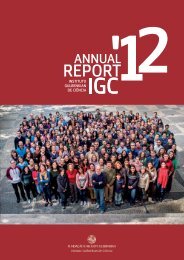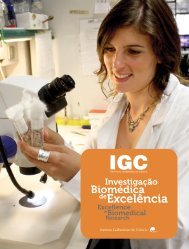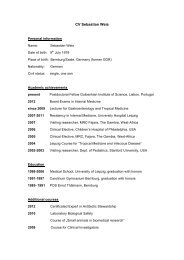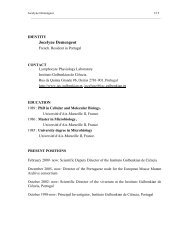organisation - the Instituto Gulbenkian de Ciência
organisation - the Instituto Gulbenkian de Ciência
organisation - the Instituto Gulbenkian de Ciência
- No tags were found...
Create successful ePaper yourself
Turn your PDF publications into a flip-book with our unique Google optimized e-Paper software.
Science Projects Support Programme<br />
Since 2009 <strong>the</strong> science communication team works with IGC researchers to<br />
provi<strong>de</strong> supervision, <strong>the</strong>oretical and experimental guidance to secondary<br />
school stu<strong>de</strong>nts carrying out science projects. In 2011, we worked with six<br />
groups of stu<strong>de</strong>nts, organising visits to IGC facilities (Drosophila and ro<strong>de</strong>nt<br />
facilities), discussions with scientists (neuroscience, Drosophila genetics,<br />
bioinformatics), providing experimental and in-class protocols (in embryology,<br />
microbiology, biodiversity, genetics).<br />
Biology in Mo<strong>de</strong>rn Times Seminars for Teachers<br />
Targeted at secondary school science teachers, <strong>the</strong> Biology in Mo<strong>de</strong>rn Times<br />
seminars aim to update teachers on current research questions, techniques<br />
and <strong>de</strong>velopments in <strong>the</strong> life sciences. IGC scientists, from PhD stu<strong>de</strong>nts<br />
to <strong>the</strong> director, led informal presentations with Q&A on immunology, <strong>de</strong>velopmental<br />
biology, evolution, neuroscience and bioinformatics. Up to 23<br />
teachers, mostly from <strong>the</strong> Greater Lisbon area, atten<strong>de</strong>d each session. The<br />
sessions were positively evaluated by <strong>the</strong> teachers.<br />
'Aqui há Ciência' for Primary School Teachers<br />
We are <strong>de</strong>veloping in-class activities and teacher-training for pre- and primary<br />
schools. The project uses enquiry-based learning, which aims to recapitulate<br />
<strong>the</strong> scientific process in each activity: observation, questioning, experimenting,<br />
registering, concluding and communicating. Two local primary<br />
schools are involved: 44 teachers and 798 stu<strong>de</strong>nts, over two years. In 2011<br />
we <strong>de</strong>veloped and put in place a microbiology activity - Clean Hands, Dirty<br />
Hands. All protocols will be available online.<br />
Partners: Oeiras City Council, <strong>Instituto</strong> Superior Técnico.<br />
Funding by: Oeiras City Council and QREN/PORLisboa (Portugal).<br />
Online Education Resources<br />
We are <strong>de</strong>veloping stand-alone educational resources for primary, middle<br />
and secondary education. Our first animation - Me and My Body - introduces<br />
and/or explores <strong>the</strong> concept of cells and <strong>the</strong> different research methods<br />
used by scientists, including <strong>the</strong> use of animals in research. Targeted mainly<br />
at 9-12 year olds, it is appropriate for all ages. This vi<strong>de</strong>o won first place<br />
in <strong>the</strong> Teaching Resources category of <strong>the</strong> international 2011 Ciência en<br />
Acción Competition (Spain) , and has received 8,841 views on YouTube. Two<br />
more vi<strong>de</strong>os, on evolution and genetics, are planned for 2012.<br />
Funding by: Casa das Ciências (Portugal)<br />
Researchers' Night 2011 - Noite dos Investigadores 2011<br />
For <strong>the</strong> fourth year running <strong>the</strong> IGC was a partner in European Researchers’<br />
Night. IGC scientists discussed <strong>the</strong>ir research with visitors and <strong>the</strong> science<br />
communication team carried out evaluation of impact on <strong>the</strong> public and participating<br />
researchers. Questionnaire-based surveys were <strong>de</strong>signed, carried<br />
out and analysed. Noite dos Investigadores 2011 took place in 15 cities across<br />
Portugal, reaching over 10,000 on-site visitors.<br />
Jardim Porcelânico - an artist in <strong>the</strong> laboratory<br />
During his resi<strong>de</strong>ncy at <strong>the</strong> IGC, British artist Rob Kesseler used a range of<br />
microscopy techniques to explore <strong>the</strong> micro-structures and cellular patterns<br />
of Portuguese wildflowers. The result was a series of powerful, high chroma<br />
images that were translated into large metre-wi<strong>de</strong> prints (Morphogenesis<br />
@ IGC, February 2011) and a porcelain collection produced in collaboration<br />
with Vista Alegre Atlantis (Jardim Porcelânico @ FCG February 2011, British<br />
Council March 2011, School of Pharmacy July 2011).<br />
Collaborators: FCG UK Branch.<br />
Funding by: FCG Joint Fund<br />
C2 - scientists and artists exchange<br />
The IGC and <strong>the</strong> FCG Mo<strong>de</strong>rn Art Centre (CAM) joined efforts in <strong>the</strong> C2 programme<br />
of visits and informal seminars, aimed at fostering an exchange of<br />
perspectives and views between scientists and artists. Three artists (Rui<br />
Sanchez, Didier Fiuza Faustino and Miguel Palma) <strong>de</strong>scribed and discussed<br />
<strong>the</strong>ir work at <strong>the</strong> IGC; three scientists (Thiago Carvalho, Élio Sucena, Nuno<br />
Moreno), led tours of <strong>the</strong> artists' shows at CAM, and CAM-gui<strong>de</strong>d tours were<br />
provi<strong>de</strong>d specifically for IGC staff and friends.<br />
A still of <strong>the</strong> 'Me and My Body' award-winning animation.<br />
British artist Rob Kesseler’s Jardim Porcelânico, at <strong>the</strong> <strong>Gulbenkian</strong> Foundation.<br />
IGC ANNUAL REPORT ‘11<br />
PUBLIC ENGAGEMENT IN SCIENCE<br />
167






